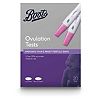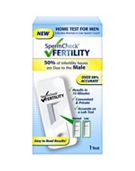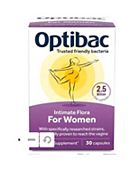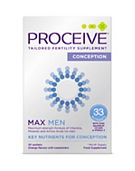Save €5 for every €50 spent on selected baby with code BABY5 Online only. Hurry, don't miss out!
Boots Ovulation Tests - 20 Pack
In order to buy non-prescription medicines you must be a registered user of our site as we are obliged to record your transaction history. We also ask that you complete our questionnaire so our pharmacy team can check that this product is suitable for you to buy.
Disabled or chronically sick people can claim VAT relief on purchases for personal or domestic use that are applicable to their disability or sickness.
Check store stock overlay
 Product details
Product details
How to use
Read complete instructions before use.
Remove the cap and hold the absorbent wick in your urine stream for at least 5 seconds. Read the result 5 minutes after conducting the test.
Any urine specimen is suitable for ovulation testing but it is important you test at the same time of each day.
Hazards and Cautions
Delivery options
Click & Collect
€2.50 or free if you spend €25 or more from your choice of 88 stores.
Exceptions apply for orders containing products with a green cross symbol. See Click & Collect for more details.
Standard Delivery
€5 or free when you spend €40 or more
For more information see our delivery help or view our returns policy.
Customers who viewed this also liked
Save €6 on selected Clea…
€68.99
30 UNI|€2.30 per 1UNI
Customers who bought Boots Ovulation Tests - 20 Pack also bought
3 for 2 on selected Vita…
€30.99
60 UNI|€0.52 per 1UNI
Bestselling planning for a baby
3 for 2 on selected Vita…
€30.99
60 UNI|€0.52 per 1UNI
3 for 2 on selected Vita…
€24.49
30 UNI|€0.82 per 1UNI
3 for 2 on selected Vita…
€59.99
30 UNI|€2.00 per 1UNI


















